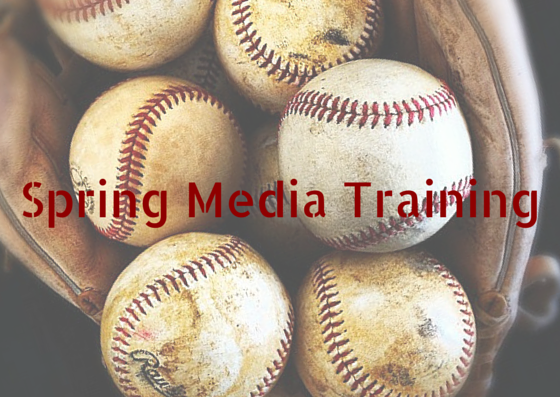Tips from the Dugout: How to Knock it Out of the Park with this Season’s Media Interviews

Posted By Marian Hughes on March 20, 2015
The boys of summer are back! Spring Training is underway and ballparks across the Cactus and Grapefruit Leagues are bustling with action as our favorite players warm up for the intense season ahead. Year after year, these great athletes embrace the opportunity to fine tune their game before Opening Day. No player is too good to show up.
A pre-season training strategy can make a lot of sense outside of the ballpark, too, across many aspects of business life. Take media interviews, for instance. Even the most savvy spokesperson can be rattled by a curve ball question during a press interview. This kind of dicey situation could be avoided with a little media training refresher. So in the spirit of Spring Training, we've developed this a series of media training refreshers to help fine-tune your company spokesperson's interviewing skills. This first post is your warm-up.
It all Starts with the Right Mindset: Storytelling
Let's start at the very beginning. All great spokespeople inherently understand what a reporter needs to develop a story. Before jumping into interview techniques and tactics, take the time to ensure that the points below truly resonate with your spokesperson
A reporter is a storyteller on a deadline. What he or she wants from you, the spokesperson, are three things:
- News value: relevance to the big picture
- "Sound bites" for color
- Timely response and follow up
As a spokesperson, you're also a storyteller. A strong spokesperson doesn't just answer questions; they know how to tell their story with confidence, control and credibility. And, they know how to get to the key points of their story, even if the right questions aren't asked. They know if they don't articulate their key messages, they won't see them in print.
The Playbook of a Great Story
So how does one become a better storyteller? By making sure you have the right plays in your playbook.
The Right Content – A reporter rarely wants to talk to you just about your company or product. Rather, they are interested in hearing about your company or product in the context of a bigger picture. Become well versed in how your offering is relevant to current trends and issues in the market. When asked a question, tie your company back to those trends and explain how you are relevant and why this story is interesting and timely. And finally, be sure you are knowledgeable about the competitive landscape so you can clearly differentiate your company, product or service from the other well-known alternatives.
The Ability to Engage – Think about the best storytellers you know. They engage you not only with what they have to say but also by how they say it. They use vocal variation and draw you in with their body language. These same voice and body-language techniques should be authentically used to connect with a reporter in an interview. Train yourself to refrain from using industry jargon, which can be boring and a turn-off to the media. Instead, talk in layman's terms, which will make you and your message more relatable. Know going in that a reporter is looking for soundbites, and have a few colorful anecdotes or unexpected metaphors about the topic at hand that will help make it easier to understand.
The Ability to Stay Focused – As I stated earlier, a good spokesperson understands that if you don't articulate your key messages, you won't see them in print. Therefore, the mission of an interview is not simply to answer questions, but to also artfully convey relevant company messages. A seasoned spokesperson goes into an interview focused on their three key messages. He or she practices ways to credibly deliver those messages in a graceful, relevant manner, no matter what questions may be asked. Additionally, he or she is skilled at keeping their focus and their emotions in check, even if difficult and unexpected questions may be thrown their way. How does this happen? Through pre-interview practice, expecting the unexpected questions, and practicing the delivery of thoughtful responses and bridging techniques.
Are you starting to feel warmed up and thinking about ways to perfect your storytelling skills? Stay tuned for our next blog post, where we'll share Tier One's proven media interview "wind-up" to help you not only prepare for an interview but deliver it straight up the middle and down.

Marian Hughes
Marian Hughes is a Co-founder and Managing Partner at Tier One, where she leads the agency's Chicago office. With more than 30 years of agency experience, Marian has helped shape communications programs for innovative technology brands since the 1990s dot-com boom. Her greatest love is building and leading agile teams that delight clients with creative programming and breakthrough results. When she is not working, Marian enjoys nature and the outdoors — whether through hiking, gardening, or on the pickleball court.


